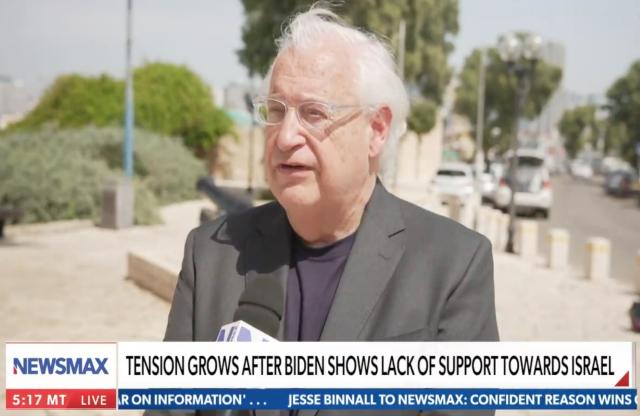In the last six months, former U.S. Ambassador to Israel, David Friedman has been very vocal in his criticism of the Biden administration, specifically as it relates to Israel's war on Hamas. However, recently the tone has increased as has his appearances and what began as softball critiques expected of those on opposite ends of the political spectrum has now morphed into outright condemnation, even going so far as to say that the Biden administration is aiding Hamas. From webcasts to appearances on major American cable news networks, the Ambassador is making sure his opinions are being heard.
This morning, in a revealing discussion with Israeli media outlet Yediot Ahronot's "Ynet Studio", Friedman voiced strong criticisms regarding the current U.S. administration's approach toward Israel, particularly in the context of the recent United Nations Security Council resolution related to the cease-fire in Gaza. Friedman characterized the U.S.'s failure to veto the resolution as a profound letdown, implicating not only President Biden but the Democratic Party as a whole in what he describes as a betrayal of Israel.
Friedman's comments come against a backdrop of escalating tensions and complex dynamics on the global stage, especially considering the ongoing conflict in Gaza. He pointed to the celebration of the UN resolution in Tehran by Hamas leader Ismail Haniyeh as evidence of the opposition's bolstered confidence, which he believes complicates efforts to negotiate the release of hostages held by Hamas. Such developments, according to Friedman, raise legitimate questions about the strength and future of the U.S.-Israel alliance.
Good reporting here by @DanielCohenTV https://t.co/SXtOe7dzP7
— David M Friedman (@DavidM_Friedman) March 26, 2024
Expanding on his critique, Friedman suggested that the actions of key Democratic figures, from Bernie Sanders to Chuck Schumer, have contributed to a disheartening shift in the party's stance toward Israel. He emphasized the importance of addressing any disagreements privately, rather than through international bodies like the United Nations, which he argues have historically not been allies of Israel.
Friedman also highlighted the potential long-term ramifications of the current strategy in Gaza. He warned that if the conflict concludes without the complete dismantlement of Hamas, its leader Yahya Sinwar could emerge as a celebrated figure among adversaries, further complicating regional stability. Last week, Friedman told Newsmax's Daniel Cohen that that no one is paying attention to Biden's statements and actions in the world as much as Hamas’ leader in Gaza Yahya al-Sinwar. Friedman said: "Do you know who is listening most carfully to this, of all people? Yahya Sinwar the head of Hamas. And he hears is and do you know what he says? He says, 'look what I did. I destroyed the relationship between America and Israel. I undermined the elected leader of the Jewish State. I have brought America to a point of friction with Israel and that makes me a big winner'."
David Milstein, former special assistant to U.S. Ambassador to Israel David Friedman, said the results show that the Biden administration "is completely wrong when they falsely claim there is some sort of a distinction between the views of most Palestinians and Hamas.”…
— The Washington Times (@WashTimes) March 23, 2024
On Israel's Channel 14 last week, Friedman said that It was common knowledge that Hamas cannot beat Israel in a military war and therefore, the Palestinian terror group’s hopes are reliant on the U.S. using their pressure to force Israel to stop the war. Friedman further attributed Biden's policy to what he defined as “narrow partisan interests” in an election year where it seems the race is a rematch of 2020 between him and former President Trump, a suggesting it aims to placate the significant Arab voting population in states like Michigan and Minnesota.
Addressing the timing of these developments amid an election year in the U.S., Friedman suggested that electoral politics should not dictate foreign policy decisions, especially when it comes to matters of principle and strategic partnership with allies like Israel. He reflected on the approach of the Trump administration, under which he served, as being more unequivocally supportive of Israel's right to self-defense and less inclined toward pushing for a two-state solution or a premature cease-fire.
Because Biden needs to win Michigan, and paying attention to American hostages being tortured by Hamas would thwart his ability to appeal to his antisemitic base. https://t.co/2okM6Z5ESU
— Erielle Azerrad (@politicalelle) March 27, 2024
The conversation with Friedman underscores a period of introspection and potential recalibration in U.S.-Israel relations, highlighting the intricate interplay between domestic politics, international diplomacy, and the imperatives of national security.


